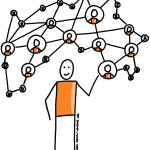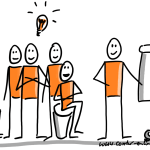Strategy & Change
Attitude, transparency and an open, trusting exchange are fundamental requirements for success. To ensure your own future viability, it is essential to address important topics strategically and anchor them holistically in your company.
But what does that mean? What is the role and responsibility of executives in shaping this change? And how can they inspire others to embrace it?

Inspire with vision and strategy
To accompany you on your way, we would like to understand you and your organization. And shape the future from a people-oriented, courageous and eye-to-eye perspective.
The starting point for us is your company’s vision, the definition of who, what or how you want to be. What relevance do the trends hold for your company? With what level of ambition do you want to move them forward?
We support you in developing your strategy – your path to your vision, based on analyses. This includes identifying key areas for action and setting goals. In the following step, you will get specific, breaking down complex ideas into manageable work packages and assigning clear responsibilities.
With your corporate strategy, you create a framework for action in your company: You provide employees with orientation and executives with a basis for decision-making.
For us, the development of your strategy is the first step, and the involvement of executives is an important element to ensure that they take ownership of the implementation.
In the next phase, it is important that you communicate and convey your strategy so that your employees receive orientation, understand priorities and decisions, and can contribute to a successful implementation.
Convince with a clear vision and inspire with an exciting story!
Provide orientation
Reduce uncertainty
Strengthen the ability to change
Develop a common language
Change capability and corporate culture
And then comes the disillusionment: Implementation means change. Change means uncertainty. Uncertainty means resistance. The interrelationships are complex and it is not enough to change only structures, processes or systems.
We are convinced that the development of your organization has to be holistic and that, in addition to structures, processes AND systems, your corporate culture plays an essential role. Most change projects fail because of the people, because it is about their needs, emotions and ability to change, if you want to manage change successfully. But how do you take others with you? And how do you persevere together?
The demands on executives are challenging, sometimes ambiguous, and daily life becomes a balancing act between strategic and operational issues: Managing long-term transformation processes and change projects while ensuring performance and results in the day-to-day business.
This is where our capability building comes in: We are your partner and guide and empower you to navigate in a new direction and master the change process over the long term.
A CHANGE COMPASS TO NAVIGATE

A CHANGE COMPASS TO NAVIGATE
With Janssen’s Model®, based on the Four Rooms of Change theory, we offer you an instrument with which you can develop and strengthen your own, your employee’s and hence your organization’s change capability.
We understand this as the “mindset” in the sense of readiness for change and the ability to deal with change. You create respect and understanding for other perspectives and develop a common language to navigate your employees through change.
And thus develop a change culture as a basis for performance and good results.
CONTUR is the exclusive partner of Janssen’s Model® in Germany!



Successful, ecologically and socially responsible management. Getting all employees on board and involving them.

WHAT ELSE MATTERS
Other levers that you can use for the sustainable success of your change process.
We support you here as well!
WHAT ELSE MATTERS
Other levers that you can use for the sustainable success of your change process.
We support you here as well!
WHAT ELSE MATTERS
Other levers that you can use for the sustainable success of your change process.
We support you here as well!
What challenges are you facing?
What do you want to change?
We would be happy to accompany you on your way to bring your change into the organization holistically and to implement it successfully with your employees.
Contact us!


Stephan Piwanski
Head of Personnel & Organizational Development
What challenges are you facing?
What do you want to change?
We would be happy to accompany you on your way to bring your change into the organization holistically and to implement it successfully with your employees.
Contact us!





